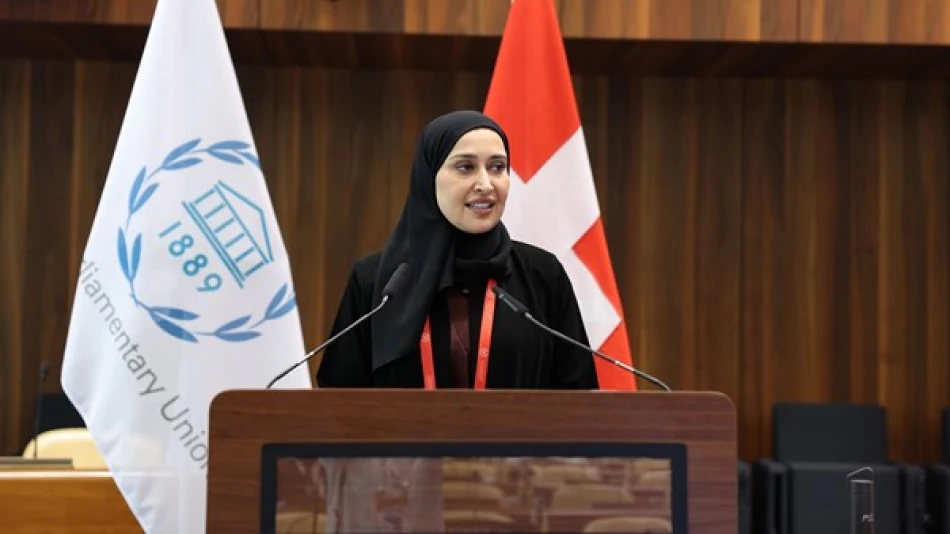
Federal National Council Participates in 15th Summit of Parliamentary Speakers in Geneva
UAE Positions Itself as Regional Champion for Women's Parliamentary Leadership
The United Arab Emirates is leveraging its track record on women's empowerment to secure greater influence in international parliamentary circles, with officials announcing Abu Dhabi will host a major Mediterranean parliamentary women's forum in 2026. The move signals the UAE's ambition to expand its soft power influence beyond the Gulf region while capitalizing on its genuine progress in female political participation.
Strategic Diplomatic Positioning
Speaking at the 15th Summit of Women Speakers of Parliament in Geneva, Maryam Majed bin Thaniah, Deputy Speaker of the UAE's Federal National Council, positioned her country as a regional model for women's empowerment. Her announcement that Abu Dhabi will host the second Parliamentary Women's Forum from January 26-28, 2026, represents more than ceremonial diplomacy—it's a calculated move to cement the UAE's role as a progressive voice in Middle Eastern politics.
The summit, organized by the Inter-Parliamentary Union in cooperation with the Swiss Parliament, provided an ideal platform for this announcement. By hosting such events, the UAE continues its strategy of using international forums to project an image of modernity and inclusiveness that contrasts sharply with regional neighbors.
Substance Behind the Symbolism
Measurable Progress in Female Representation
The UAE's claims carry weight when measured against concrete achievements. The country's Federal National Council achieved 50% female representation following the 2019 elections, surpassing many established democracies. This wasn't accidental—it resulted from deliberate government policies including reserved seats and active encouragement of female candidates.
In the broader government structure, women hold approximately 75% of public sector positions and occupy senior roles across ministries. The UAE appointed the world's youngest female minister at age 22 and has consistently ranked among the top Middle Eastern countries for gender parity in the World Economic Forum's Global Gender Gap Report.
Regional Context and Comparisons
Bin Thaniah's emphasis on the UAE as a regional inspiration reflects genuine disparities across the Middle East and North Africa region, where female parliamentary representation averages just 18%. Countries like Saudi Arabia, despite recent reforms, still maintain significant restrictions on women's political participation, while others like Lebanon and Tunisia have made progress but face economic and political instability that hampers sustained advancement.
Strategic Implications for Regional Influence
Soft Power Investment
Hosting the Mediterranean Parliamentary Women's Forum positions the UAE strategically between Europe, Africa, and Asia—reflecting its broader economic and diplomatic strategy. The timing, coinciding with preparations for COP28 follow-ups and ongoing regional diplomatic initiatives, suggests coordination with the UAE's wider international engagement strategy.
This approach mirrors successful models from Singapore and Switzerland, countries that have leveraged hosting international forums to build diplomatic influence disproportionate to their size. For the UAE, women's empowerment provides a less controversial avenue for regional leadership than traditional security or economic dominance.
Economic Dimensions
The focus on women's empowerment also serves economic interests. The UAE's Vision 2071 aims to make the country the world's best by its centennial, requiring maximum utilization of human capital. Countries with higher female workforce participation typically show stronger economic growth, and the UAE's leadership recognizes this correlation.
Furthermore, as the UAE diversifies its economy away from oil dependence, sectors like technology, finance, and tourism—where the country is investing heavily—benefit significantly from gender-diverse leadership and workforce participation.
Challenges and Credibility Questions
Despite genuine progress, the UAE faces scrutiny over broader human rights issues that could complicate its positioning as a progressive leader. International human rights organizations continue to raise concerns about civil liberties and political freedoms, potentially limiting the country's soft power effectiveness in some circles.
The challenge for UAE leadership will be maintaining credibility on women's empowerment while addressing these broader governance questions. Success in this balancing act could establish a new model for authoritarian modernization, while failure might limit the impact of genuine achievements in gender equality.
Looking Ahead to 2026
The Abu Dhabi forum will serve as a crucial test of the UAE's ability to translate domestic progress into regional influence. Success will require demonstrating concrete outcomes from women's political participation, not just representation statistics. The UAE's track record suggests it understands this distinction and will likely showcase tangible policy achievements driven by female leadership.
For the broader region, the UAE's approach offers a potential pathway for countries seeking to modernize while maintaining political stability. Whether this model proves sustainable and replicable will significantly influence Middle Eastern political development in the coming decade.
Most Viewed News

 Layla Al Mansoori
Layla Al Mansoori






